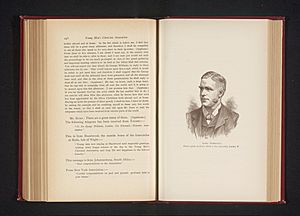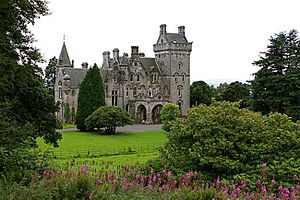John White, 1st Baron Overtoun facts for kids
Quick facts for kids
John Campbell White
|
|
|---|---|
 |
|
| Born | 21 November 1843 Rutherglen, Scotland
|
| Died | 15 February 1908 (aged 64) Overtoun House, Scotland
|
| Alma mater | University of Glasgow |
| Occupation | chemical manufacturer philanthropist politician |
| Spouse(s) | Grace Eliza McClure |
| Parent(s) |
|
John Campbell White (born 1843, died 1908) was an important Scottish businessman. He made chemicals and was also a very generous person who supported many good causes. He was also a politician for the Liberal Party.
In 1893, he was given the special title of Baron Overtoun by Prime Minister Gladstone. Later, the cities of Rutherglen and Dumbarton gave him "Freedom of the City." This was to thank him for all his charity work.
However, there was a big problem. Even though he was known for his kindness and strong religious beliefs, his workers faced very tough conditions. A politician named Keir Hardie wrote about these unfair conditions in 1899.
Contents
Early Life and Education
John White was born in 1843 near Rutherglen, Scotland. He was the only son of James White and Fanny Campbell. His father, James White, was a lawyer who later joined the family chemical business.
John attended Stow's Academy in Glasgow and then the University of Glasgow. He was a bright student and won awards in logic and science. He even worked in the laboratory of the famous scientist Lord Kelvin for a year.
His Chemical Business
John White finished university in 1864. After working for other companies, he joined his father's chemical business in 1867. This company, called Shawfield Chemical Works, was one of the biggest in the world. It employed about 500 men.
The main product they made was potassium dichromate, used in many industries. After his father passed away, John White and his cousin, William Chrystal, became the main owners.
While Lord Overtoun was known for his charity, his workers faced very low wages. They also had to work long hours, sometimes seven days a week. Workers who took time off for church even had their pay cut. This meant that some of his great wealth came from these difficult working conditions.
Religious Beliefs and Charity
John White was a strong supporter of the Free Church of Scotland. He gave money to build a mission hall in Dumbarton. He also played a big part in uniting different churches in Scotland in 1900.
In 1874, he was inspired by the speeches of a preacher named D. L. Moody. White became the president of the Glasgow United Evangelistic Association. He helped build a large center in Glasgow for religious training and youth groups. He also taught Bible classes and preached across Great Britain.
In Politics
John White was a member of the Liberal Party. He led the Liberal Association in Dunbartonshire. He supported William Ewart Gladstone when the party disagreed about Irish Home Rule in 1886.
In 1893, Gladstone suggested that White be given a special title. He became Baron Overtoun, which is a type of noble title. In 1907, he was appointed Lord-Lieutenant of Dunbartonshire, a high position in the county. He also served as a Justice of the Peace.
His nephew, James Dundas White, also became a politician for Dunbartonshire.
Family and Lasting Impact
Lord Overtoun married Grace Eliza McClure in 1867. They did not have any children. He passed away in February 1908 at his home, Overtoun House, at the age of 65. His title, Baron Overtoun, ended with him.
He left a large amount of money, which was about £689,022 at the time. This is equal to millions of pounds today.
Lord Overtoun donated money to create public parks. One park in Rutherglen still carries his name, Overtoun Park. He also gave £5,000 to buy land for Dalmuir Park in Dalmuir. However, his chemical works also left a lot of toxic waste in the areas around Rutherglen and Cambuslang for many years.
Images for kids
 | Jewel Prestage |
 | Ella Baker |
 | Fannie Lou Hamer |




